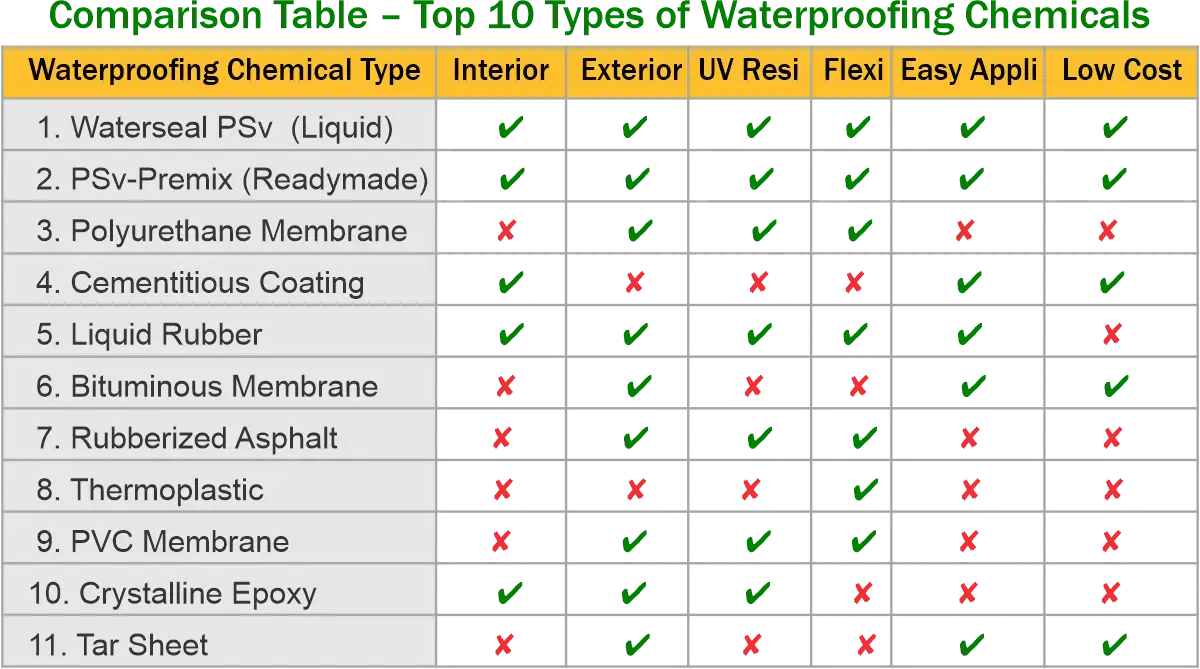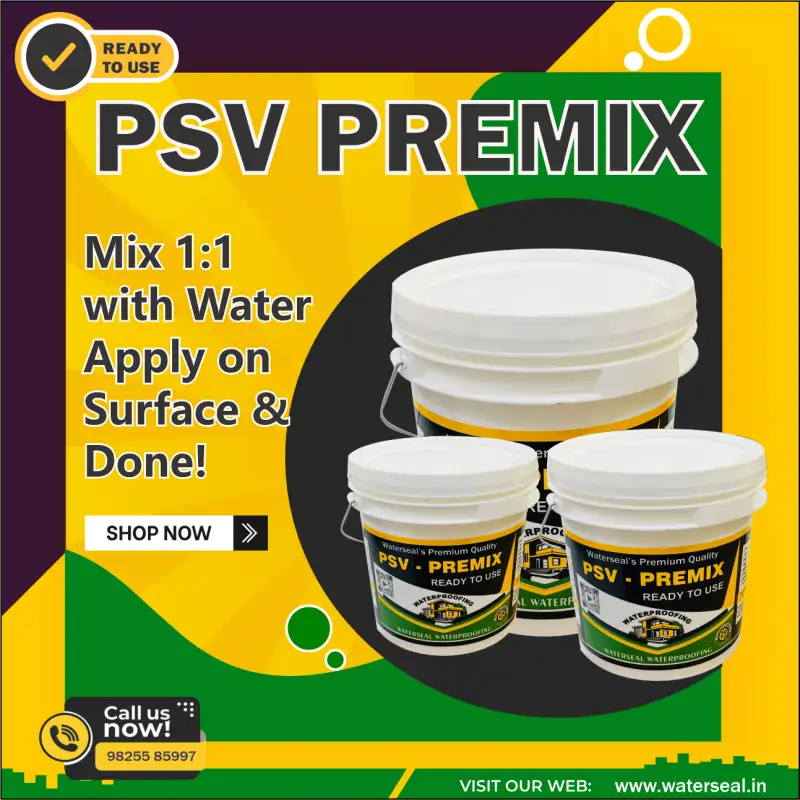Top Types of waterproofing Chemicals used in constructions and old buildings.
Types of waterproofing chemicals are essential for safeguarding both new constructions and aging buildings from moisture-related damage. These chemicals help create a water-resistant barrier that prevents leakage, seepage, and structural weakening over time. Commonly used types include cementitious coatings, liquid waterproofing membranes, bituminous compounds, and polyurethane-based solutions. Each type is chosen based on the specific area of application, such as terraces, basements, bathrooms, or exterior walls, ensuring long-term durability and protection of the structure.
Types of Waterproofing Chemicals: Choosing the Right Solution for Your Building
When you begin an initial consultation with a waterproofing company, they will usually introduce you to various types of waterproofing chemicals and suggest the most suitable solution based on your needs. However, selecting the right chemical isn’t just about price — an expensive option doesn’t always mean it's the best.
The ideal waterproofing material depends on which part of the building you want to protect from water damage. Broadly, there are three key areas where waterproofing is commonly required:
- Waterproofing for external walls and basement walls
- Waterproofing for bathrooms and water tanks
Waterproofing for roofs, terraces, and balconies
In this guide, we aim to give you a complete overview of the most effective types of waterproofing chemicals used in each of these areas — along with their benefits and limitations — based on our 29+ years of professional waterproofing experience.
Types of Waterproofing Chemicals Used in Construction and Old Buildings
Waterproofing is essential to protect a structure from water damage, improve its durability, and maintain a leak-free environment. Choosing the right waterproofing method depends on the structure's location, usage, and budget. Below is a comprehensive list of the top types of waterproofing chemicals used in modern construction, renovation, and industrial applications.
1. Polymerized Silicone Vinyl Waterproofing (PSv)
Top-performing waterproofing system for long-term protection
PSv is one of the most advanced types of waterproofing chemicals, combining silicone polymers, micro-fibers, and high-performance additives. This system is ideal for both new construction and old building repairs, offering superior moisture protection.
1. Polymerised Silicone Vinyl Waterproofing (PSv)
Top-performing waterproofing system for long-term protection
PSv is one of the most advanced types of waterproofing chemicals, combining silicone polymers, micro-fibers, and high-performance additives. This system is ideal for both new construction and old building repairs, offering superior moisture protection.
A. PSv Liquid
A liquid form that is mixed with white cement and water. Best suited for:
✅ External walls
✅ Basement walls
It creates a strong waterproof barrier and protects against moisture for years.B. PSv-Premix
A ready-to-use waterproofing paste that requires only water — no cement mixing needed. It is highly effective for:
✅ Bathrooms and water tanks
✅ Roofs, terraces, and balconies
Advantages:
✔ No skilled labor or contractor required
✔ Affordable and easy to apply
✔ Always freshly packed — no old stock from distributors
Disadvantages:
✘ As orders are fulfilled online, delivery may take 5 to 7 days

2. Polyurethane Liquid Membrane
Flexible and seamless waterproofing for flat surfaces
Advantages:
✔ Excellent elasticity – adapts to surface movements
✔ Seamless application – reduces joint leakage risk
✔ Suitable for roofs and exposed areas
Disadvantages:
✘ Very sensitive to surface moisture during application – may lead to peeling or de-bonding
✘ Not ideal during monsoon or high humidity
✘ UV exposure over time can cause surface degradation in Indian heat
3. Cementitious Coating
Simple and cost-effective waterproofing for interiors
Advantages:
✔ Easy to apply – ideal for DIY or small projects
✔ Affordable and easily available materials
✔ Good for wet areas like bathrooms and kitchens
Disadvantages:
✘ Rigid – can crack with structural movement
✘ Not UV-resistant – unsuitable for open terraces or roofs
✘ May peel or weaken in high heat zones like Rajasthan or Gujarat
4. Liquid Rubber Waterproofing
Modern solution with high flexibility and durability
Advantages:
✔ Excellent crack-bridging capacity
✔ Fast-drying and seamless application
✔ Strong adhesion – ideal for basements and roofs
Disadvantages:
✘ Costlier than traditional coatings
✘ May soften in extreme Indian heat, causing loss of elasticity
✘ Not suitable for heavy foot traffic without topcoat
5. Bituminous Membrane Coating
Traditional low-cost waterproofing for flat surfaces
Advantages:
✔ Economical solution for large areas
✔ Readily available and time-tested
✔ Easy to apply on low-slope roofs
Disadvantages:
✘ Poor resistance to heat – softens in summer, can cause bubbles or cracks
✘ Not eco-friendly – emits fumes when torch-applied
✘ Shorter life span compared to PSv or PU
6. Rubberized Asphalt
Heavy-duty waterproofing for commercial and industrial use
Advantages:
✔ Strong resistance to wear and tear
✔ Quick-drying formula speeds up work
✔ Works well in high-traffic areas like parking decks and bridges
Disadvantages:
✘ Requires professional tools and expertise
✘ Not suitable for small-scale residential use
✘ High surface temperatures in India can make it brittle over time
7. Thermoplastic Waterproofing
Versatile protection for industrial fabrics and flexible surfaces
Advantages:
✔ Lightweight and durable
✔ Excellent for flexible applications like tents, ducts, etc.
✔ Resists tearing and stretching
Disadvantages:
✘ Not designed for concrete or masonry structures
✘ Can melt or deform under extreme Indian summer heat
✘ Limited use in mainstream building waterproofing
8. PVC Waterproofing Membrane
UV-resistant and long-lasting solution for roofs
Advantages:
✔ High UV and heat resistance – ideal for Indian summers
✔ Long lifespan – 20+ years with proper installation
✔ Flexible and tear-resistant
Disadvantages:
✘ Requires heat-welding or mechanical fixing – not DIY friendly
✘ Higher material and labor cost
✘ Installation errors can lead to water seepage under membrane
9. Crystalline Epoxy Coating
Advanced chemical barrier for deep waterproofing
Advantages:
✔ Penetrates into concrete to block moisture pathways
✔ Long-term waterproofing – ideal for bridges, tanks, industrial floors
✔ Also improves surface strength and chemical resistance
Disadvantages:
✘ Costly and requires skilled application
✘ Not flexible – unsuitable for surfaces with high movement
✘ May crack in hot-and-cold temperature cycles if not reinforced
10. Tar Sheet Waterproofing
Old but widely used waterproofing system for terraces
Advantages:
✔ Cheap and widely available
✔ Effective for short-term protection
✔ Easy to roll and apply on flat roofs
Disadvantages:
✘ Single-ply sheets are weak – tear or crack under stress
✘ Not heat-resistant – melts or cracks in Indian summers
✘ Short lifespan – requires frequent maintenance or replacement

Why Choose This Ready-to-Use PSv-Premix Chemical?
- Easy Application: The single-component formula makes WaterSeal PSv-Premix hassle-free for DIY users and professionals.
- Superior Protection: Formulated with premium materials to create a long-lasting, crack-resistant shield.
- Versatile Use: Ideal for terraces, basements, bathrooms, and concrete roofs.
Invest in your building’s longevity with WaterSeal PSv-Premix—the trusted ready-to-use waterproofing solution that delivers peace of mind. Act now before water damage strikes!
Looking for professional terrace waterproofing? Visit our dedicated site at TerraceWaterproofing.com for expert guidance.
WaterSeal PSv-Premix Application Guide
- Surface Preparation: Clean the surface thoroughly, removing dust and oil.
- Crack Repair: Widen major cracks using an angle grinder or hammer.
- 1st Coat: Apply a mix of 1 part WaterSeal PSv-Premix + 2 parts clean water.
- Crack Filling: Fill cracks and voids with undiluted WaterSeal PSv-Premix. (For detailed crack-filling instructions, click here.)
- 2nd & 3rd Coats: Apply subsequent layers with 1 part WaterSeal PSv-Premix + 1 part water.
For optimal results, use three coats with the recommended mixing ratio.
Drying & Coverage
- Initial Drying: 30–60 minutes (daylight conditions).
- Full Cure: 24 hours.
- Coverage: 25 kg of WaterSeal PSv-Premix covers 750 to 900 sq ft. “Single coat”
Pro Tips:
- We recommend: Three coats for maximum protection.
- For enhanced Crack protection, pair with WaterSeal’s PPC Mat Strips
Talk To Our Experts And Get a Free Estimate for Waterproofing
These FAQs should provide you with a good starting point for understanding waterproofing Solutions. Remember that it's essential to consult with a professional water-proofing contractor for specific advice and solutions tailored to your needs.


